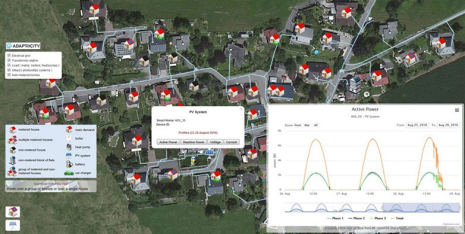Issues with grid stability, and the high cost of grid expansion are one of the biggest challenges presented by the energy transition. For renewable energy sources to make up a higher portion of a country’s energy mix, power grids will need to become more intelligent and incorporate different technologies to manage the intermittencies inherent to renewable generation.
Swiss startup Adaptricity looked to address this issue by developing a software solution that can simulate electricity grids, and help operators better understand and plan their networks. This way, says ETH Zurich, grid investments can be made more cost effective.
The software relies on data collected from smart meters, and can calculate network loads based on this, and simulate how a new energy asset, a PV plant for example, would affect the regional grid.
Adaptricity has previously acted as a consultancy with grid operators in Switzerland and Germany, but will now focus on the sale of licenses for its software to grid operators in Switzerland and abroad, which it expects to fully launch in autumn 2017.
ETH Zurich also points out that, while the software could prove an essential tool for grid operators, its success is highly dependent on the development of smart grids, and on national energy policy decisions both in its native Switzerland and in other potential markets. “Ultimately, politics will decide how much money is put into renewable energy, and thus into intelligent power grids,” states an ETH press release. “The more politicians push the issue, the better for the smart grid analysts.”
This content is protected by copyright and may not be reused. If you want to cooperate with us and would like to reuse some of our content, please contact: editors@pv-magazine.com.




1 comment
By submitting this form you agree to pv magazine using your data for the purposes of publishing your comment.
Your personal data will only be disclosed or otherwise transmitted to third parties for the purposes of spam filtering or if this is necessary for technical maintenance of the website. Any other transfer to third parties will not take place unless this is justified on the basis of applicable data protection regulations or if pv magazine is legally obliged to do so.
You may revoke this consent at any time with effect for the future, in which case your personal data will be deleted immediately. Otherwise, your data will be deleted if pv magazine has processed your request or the purpose of data storage is fulfilled.
Further information on data privacy can be found in our Data Protection Policy.